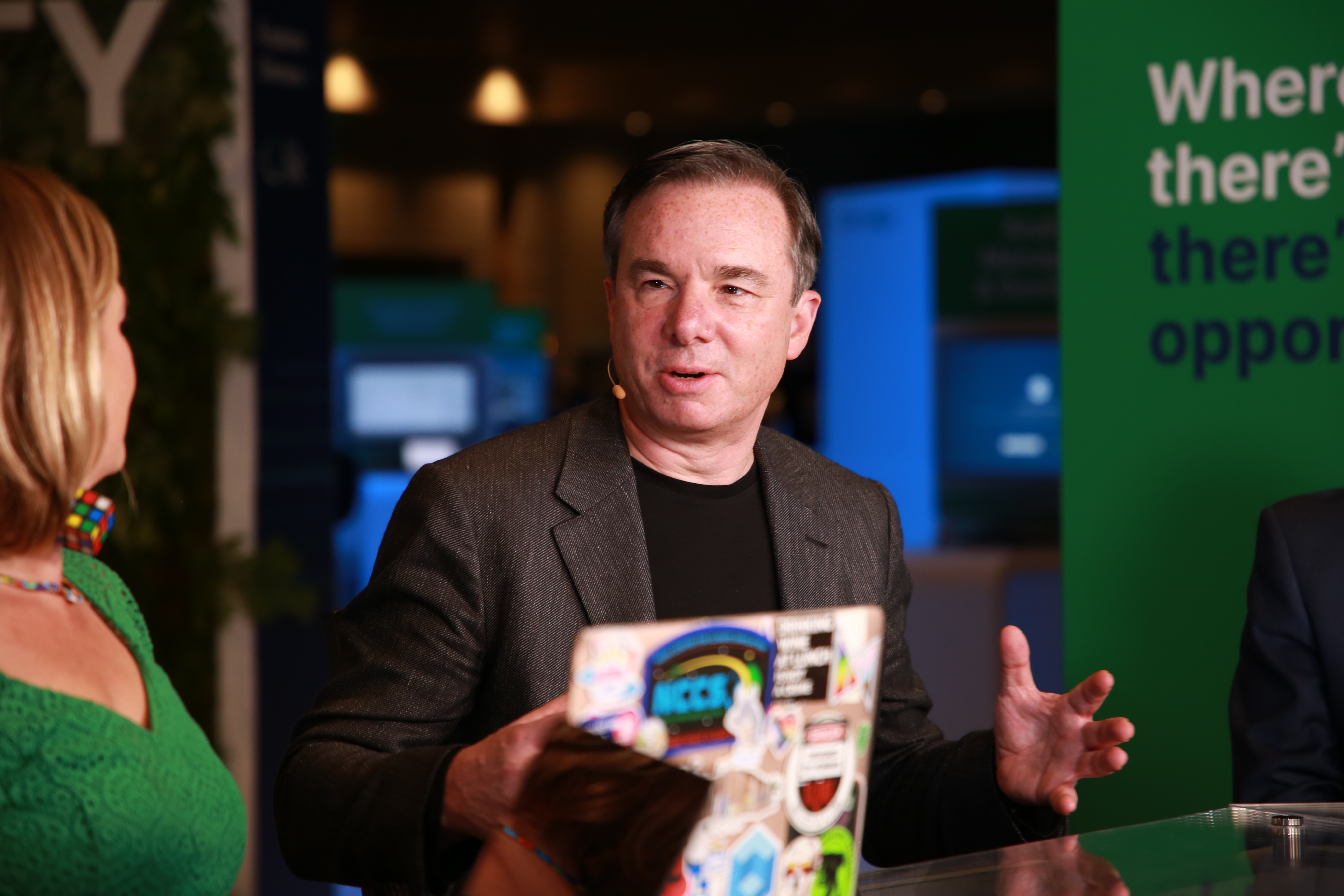 AI
AI
 AI
AI
 AI
AI
Comprehensive data solutions are becoming increasingly important as generative AI adoption grows. There is a broader platform shift ongoing, making accessibility of quality data crucially important.
How to respond to this seismic transformation in data integration and analytics innovations was a central focus of Qlik Connect. The event made it clear that QlikTech International AB has a strong culture, but also that there’s no such thing as an “easy button,” according to Shelly Kramer, managing director and principal analyst at theCUBE Research, during the event.

Shelly Kramer of theCUBE discusses what’s next for Qlik during Qlik Connect 2024.
“Data integration is key. The ability to trust your data is imperative,” Kramer said. “You have to be able to explain, not just trust it inherently, but you have to explain where it came from and have quality control in place and understand governance and lineage. That’s super important.”
Analysts for theCUBE, SiliconANGLE Media’s livestreaming studio, spoke with industry professionals during the event. They explored Qlik’s role in industry efforts to build domain-specific AI solutions and the increasing significance of data solutions. (* Disclosure below.)
Here are three key insights you may have missed from the Qlik Connect event:
In addition to being able to explain where data comes from, companies also must provide access to trusted data for everyone within an organization who needs it. Plus, businesses must have a comprehensive set of analytics and AI-powered capabilities, according to Kramer.
“You need to be able to do this on structured and unstructured data. This is really a whole new level of analytics that’s involved and analytics embedded inside business,” she said. “Last but not least, you have to take action.”
That means figuring out what an organization is going to do and automating what it can, according to Kramer. That’s not always an easy thing to do.

Savannah Peterson, Shelly Kramer and John Furrier of theCUBE analyze the latest news at Qlik Connect.
“But what the team at Qlik has done is, again, 30 years in the business, they’re no strangers to this, they’re not a startup,” she said. “Being able to work with Qlik and being able to take advantage of all these capabilities, and then the new announcements — the AWS alliance, Qlik Answers, and the Talend Cloud solution. All of this, it’s just the whole package.”
The data business has long been evolving, and generative artificial intelligence is supercharging growth. Unstructured data is not a new thing, but it’s now high volume, according to John Furrier, co-founder and executive analyst at theCUBE Research.
“Generative AI has brought a flashpoint in the data geek world, where everything comes together. It’s the confluence of many things going on,” Furrier said.
That includes innovation in cloud-scale technology and the on-premise GPU market. Custom silicon is going to power the next layer, which is the data layer, Furrier added.
“You see people’s eyes get all big when they go, ‘Wow. The script has been flipped,’” he said. “I think you’re seeing a historic moment that just gets people that are data nerds really excited. The next level is confidence. You’re starting to see the products.”
Furrier noted Qlik’s January acquisition of Kyndi Inc. At the time, the company stated it had an intention to advance its AI-driven business outcomes.
“Kyndi was a nice little addition to the Qlik portfolio. They already had an opportunity, which we’ve been covering,” Furrier said. “They’ve been doing insights on data movement and the rest of the stuff that they have. Qlik has assembled the piece parts. If you look at that, that’s now the foundation for generative AI.”
It comes back to an important subject: data governance. It’s become a crucial subject, given the fact that it’s the most important requirement for data, according to Furrier.
“If you want to let data be freely available, whether it’s vertically integrated or horizontally scalable, you’ve got to have governance. You’ve got to know what it is. You’ve got to be able to explain it. That’s the final thing,” Furrier said. “In summary, my personal takeaway is that the data business is looking a lot like the cloud native early days. Some of the same conversations.”
Here’s theCUBE’s complete keynote analysis:
As theCUBE analysts mentioned, Qlik is no stranger to the data business. But Qlik Connect was an opportunity to learn more about the company’s strategy to deliver enterprises real ROI on AI and data integration initiatives.
The company made investments at the heart of Qlik and its analytics engine, according to James Fisher, chief strategy officer of Qlik. Harnessing the power of gen AI is key to the company’s strategy around the future of data analytics.
“We took that big data wave, we’ve taken that wave to cloud, and now everything that’s happening around AI and generative AI is just such a huge opportunity, but we’ve got to do it right,” Fisher said. “We’ve got to optimize our processes, optimize our data, get that foundation, and then we can achieve great things.”
Helping customers work with data wherever it resides is at the key of Qlik’s strategy. Enabling that involves a platform with best-in-class capabilities, according to Fisher.

QlikTech’s Brendan Grady talks to theCUBE about Qlik Answers.
“We have the unique advantage of being able to support that data supply chain wherever the data resides across any cloud platform, and that creates a huge ecosystem advantage for Qlik,” he said. “The landscape is going to change around the cloud platforms that customers are using.”
The event was an opportunity to learn more about Qlik Answers, a generative AI knowledge base and assistant that business users can build and deploy themselves off of unstructured data. It’s all about streamlining generative artificial intelligence adoption.
“You’ve got to put this data at the center of everything you do, and it is generating more,” said Brendan Grady, executive vice president and general manager of the Analytics and AI Business Unit at Qlik. “From a product’s perspective, what I really see us evolving to is delivering on our vision of both structured and unstructured data.”
Here’s theCUBE’s complete video interview with James Fisher:
Qlik Connect was also a chance to examine Qlik’s strategy for growth through acquisitions and partnerships and to learn more about use cases for Qlik and its ecosystem. One example of a company leveraging AI to strengthen operations was Penske Truck Leasing Co. LP.
Penske had been looking to integrate AI into its operational platform for many years and had already been focused on data quality. Today, the company has “significant investments” in Qlik, according to Sarvant Singh, vice president of data and emerging digital solutions at Penske.

Qlik’s Mike Capone and Penske’s Sarvant Singh talk about the importance of data quality.
“If we can generate insights using gen AI capabilities right then and there, I think that is going to expedite AI value delivery for my business partners. And that is why I’m so excited about Qlik’s AI strategy,” Singh said.
Before the company had an AI solution, failures might occur when trucks went on the road. In the past, there was no way for the company to proactively do anything about it, according to Singh.
“Now with AI, we can predict when a truck is going to fail. And in a number of cases, we can actually intervene,” he said.
The data quality discussion is crucial, according to Mike Capone (pictured), chief executive officer of Qlik. Companies can’t just plug in AI and expect it to work.
“Companies like Penske who’ve done that work first laid the foundation, and now they’re achieving the value from it,” he said.
Meanwhile, Harman International has sought to build on Qlik for advanced AI-driven automation, data governance and insight generation. Harman, a company that sees its offerings extend across automotive, consumer and global tech services sectors, has been a Qlik partner for a long time, according to Nick Parrotta, president of digital transformation solutions and chief digital and information officer of Harman.
“Getting the data right was always the first foundational element,” he said. “Having great governance and master data, having an organization that’s trained and talented, both from the business side as well as the digital side is really important.”
The company has built out some “robust” use cases, according to Parrotta. The partnership combines advanced analytics and gen AI to make that happen.
“We’re trying to stay ahead very rapidly, and the partnership with Qlik has helped us do that,” he said.
Here’s theCUBE’s complete video interview with Sarvant Singh and Mike Capone:
To watch more of theCUBE’s coverage of the Qlik Connect event, here’s our complete event video playlist:
(* Disclosure: TheCUBE is a paid media partner for Qlik Connect. Neither Qlik, the sponsor of theCUBE’s event coverage, nor other sponsors have editorial control over content on theCUBE or SiliconANGLE.)
THANK YOU